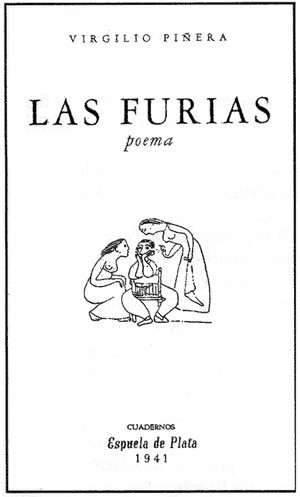4.1.2.3.2 Virgilio Piñera’s first poetic forays, “Las furias”, from 1941

Virgilio Piñera’s early work begins with the poetry collection “Las furias” (The Furies) from 1941, and the pieces he published in the two issues of the magazine “Poeta,” which he founded, and others in “Espuela de Plata.” From these years on, the themes that would, in a way, guide his entire poetic, and even narrative and dramatic output, centered on the absurd, the inconsequential, and the existential void, as well as the attempt to conjure it all away, are reflected.
In the poem that gives the notebook its title, “The Furies,” we first see Virgil’s inclination for mythological motifs and spheres, in this case associated with the destructive, inherent to a deep-rooted pessimism and preference for the gloomy, from which emerges a joy of the antipodes, difficult to understand outside of Virgil’s universe:
“This frozen crystal of the person
among falling Furies he has fun.
The extinguished candles solemnize the dream of her laughter
and the teeth that initiate destiny.
To a wind of corpses
the hem of his tunic questions.
It is the plumb pen of the Furies
the one that beats on the forehead of the gods,
beyond the skin, in a deaf flight,
requesting the poisoned river.
(…)
(…)
Is it not that the river divides falling between you?
Isn’t it that the waiter of melancholies
furiously hates those islands of consecrations?
A yellow rage,
a yellow cloth,
a yellow mirror,
a yellow rain,
“That’s all that remains, merry Furies.”
Throughout his early career as a poet, and especially in this collection of poems, the theme of death and nothingness as the only reality is already evident, completely inconsequential in his worldview, but an unconscious and self-denying romanticism is also hinted at, which surfaces in many of the pages.
Although Orígenes did not yet exist as a magazine, the discordant nature of Piñera’s poetics with respect to the rest of the Origenists can already be seen here, as well as the imprint of a tropicalized surrealism and zones akin to Kafka’s apprehensive universes.
In these poems, we can also discern the first signs of what has been termed antipoetry, not so much in terms of vocabulary as in the underlying content; for while the transcendentalist attitude dominated the poetic landscape of his time, Piñera emphasized the inconsequentiality of reality, in a desperate effort to desacralize and expose as is his conceptions of nothingness, death, as the only path forward.








